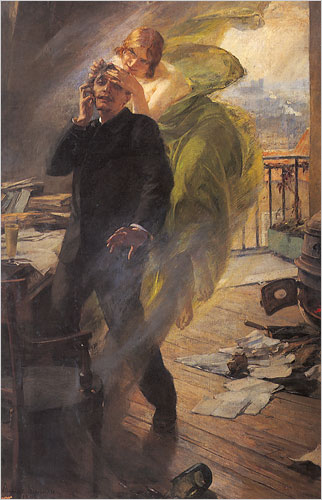In fact, suicide is extremely common among artists. Almost as common as alcohol and drug addiction and mental illness. We all "know" artists are misunderstood, tragic, and starving, only to be recognized and accepted long after death. But why?
 | |||
| Le Suicidé, a Manet, from Wikipedia |
 |
| The Death of Chatteron, H. Wallis, from Wikipedia |
 |
| La Muse Verte, A. Maignan, from Wikipedia |
Depression among creative people is one of those accepted truths. It is so ingrained in our culture that painters have painted it, singers have sung about it, and writers have written about it. Kayne West, for example, alludes to suicide and depression quite a bit in his music catalogue. He is crying for help in front of millions.
For those who do not entertain suicide ideations (at least at first), there is the ongoing problem of addiction. There are too many examples to count all of the artists who drank, snorted, injected, or inhaled themselves to death. From John Wayne to Elvis Presley to DJ Screw to Amy Winehouse.
I'm writing this post to fight some of my own demons. I get extremely depressed often. I know others who get just as depressed. I've doubted my abilities. I sometimes grow angry at God for not taking away the thoughts and pain. I've contemplated suicide, mostly during my teens. I sometimes avoid getting intimate with people for fear they might think something is wrong with me. I recognize the patterns of addiction too well, and I try to avoid alcohol and drug abuse. Food was my main addiction. But others I know have battled with drugs and alcohol. Some don't even realize they have a problem.
For me, I wondered why others did not enjoy what I thought were the individual notes in the symphony of life. I would look at a wood table and be fascinated by the beauty of the pattern, but realized I could not share this with others. "It's just a table" would be a normal response. Or maybe just the thought that I'm an eccentric. Then you realize how alone you are in the world you created for yourself:
One theory suggests that many creatively gifted individuals may suffer from depression as a result of being in environments that don't support their creativity. In the The Woman's Book of Creativity, C. Diane Ealy, PhD, writes, "Many studies have shown us that a young girl's ideas are frequently discounted by her peers and teachers. In response, she stifles her creativity.” Other experts agree that suppressed and misunderstood creativity can lead to severe neurotic and psychotic behavior, addictions, unhealthy relationships, concealment of abilities, hopelessness, and depression.
Gifted and talented people are often divergent thinkers who have unusual, original, and creative perception and elaborate fantasies. They may disagree with authority, invest in their own interests, and express unpopular views. This can present social challenges, particularly for girls and women, as a result of a cultural expectation to conform.
Gifted and talented people generally receive little acceptance for their unique selves, and may have poor self-esteem and difficulty trusting people. This situation can lead to feelings of isolation and frequent bouts of depression.
Gifted and talented adults are driven to express their inner creativity but may be hindered by self-criticism, self-doubt, and feelings of inferiority, says Mary Rocamora, who heads a school in Los Angeles for gifted and talented adults. When this happens, frustration can turn into hopelessness and depression.
--Amy Scholten, MPH "Creativity and Depression: Is there a Link?"
As artists, we do not have to accept that we will always be depressed en masse. I urge any depressed artists to talk about their feelings of self-doubt to someone you trust. Someone supportive. The stereotype of the tortured genius might actually hurt the artist community. Romantic notions about a life of pain because you are an artist are a lie. Do not accept your depression. Avoid addiction, even if you think drugs and alcohol fuel your creativity. They do not and never did. If you are thinking about suicide, talk to a professional. Suicide never solved anything and affects everyone who ever knew you. And if anyone thinks you are an eccentric, that's their problem, not yours. Be yourself.
Happy Filmmaking.
No comments:
Post a Comment